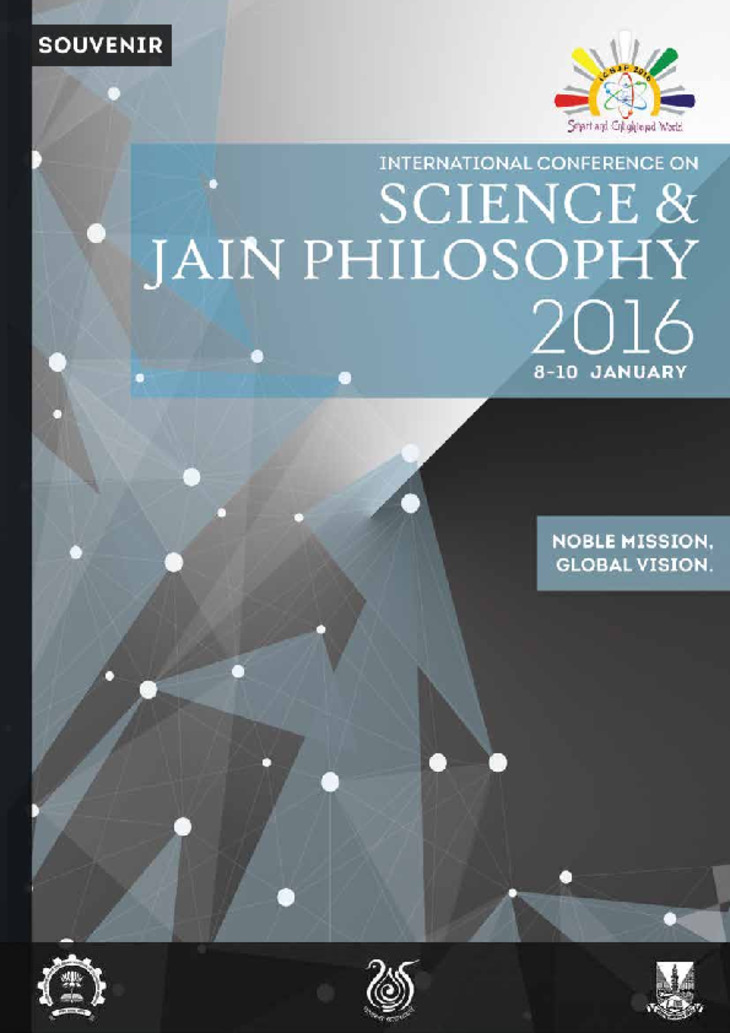
International Conference on Science and Jain Philosophy
 Dr. Samani Chaitanya Prajna, Ph.D is a senior disciple of Acharya Mahashraman. She is a Professor and Head of the Department of Jainology and Comparative Religion & Philosophy of Jain Vishva Bharati Institute, Ladnun. She is also the Executive Director of Bhagawan Mahavira International Research Center, JVBI, Ladnun.
Dr. Samani Chaitanya Prajna, Ph.D is a senior disciple of Acharya Mahashraman. She is a Professor and Head of the Department of Jainology and Comparative Religion & Philosophy of Jain Vishva Bharati Institute, Ladnun. She is also the Executive Director of Bhagawan Mahavira International Research Center, JVBI, Ladnun.
Your journey starts with your own self. Who am I, where am I? This exploration leads to the investigation of various forms of life and cosmology. This heads to the next level of search-what is spiritual about this science? As you look into that, there arises a further question: why diversity? If you explore all these questions, you know Jainism!!!
The present article is meant to explore philosophy and science behind the idea of spirituality in Jainism. Philosophy refers to intuitive and logical knowledge obtained through spiritual awakening and reasoning. Science refers to a system of acquiring knowledge. This system uses observations and experimentations to describe and explain the natural phenomena. The idea of spirituality presented in this article is based on intuitive knowledge which is also verifiable to a certain extent by the observations and experimentation of science. It would be better to clear at the outset that the article is meant to give a blue print of the Jain idea of Spirituality rather than provide a detailed study about Jainism. Further details will be explored in the subsequent articles in this series.
The idea of spirituality in Jainism is based on the concept of the soul. Spiritual awakening, perfection, enlightenment and divinity are the core components of spiritualism. Spiritual awakening is possible through self-awareness and the self-awareness is possible through knowledge of the true self. Thus, inquiry into the nature of our true self is the foundation of spiritual excellence or divine consciousness in Jainism. The philosophy and science working behind the idea of spirituality in Jainism starts with the inquiry of the true self and ends with the realization of the true self.
The inquiry of the true self starts with the queries, 'who am I?', 'Where I am coming from?', 'Where Will I go after I die?' and so on. In the view of Bhagawan Mahavir, the answers to these queries can be obtained clearly and distinctly if one is able to look into his/her past lives. The experience of the past lives opens many secrets of our existence in this world. The secrets can be seen as four watches. The four watches have taken the place of fundamental doctrines of Jain philosophy and science working behind the idea of spirituality.
The four doctrines are:
- Atmavad: The Doctrine of Soul
- Lokavad: The Doctrine of Cosmos
- Karmavad: The Doctrine of Karma
- Kriyavad: The Doctrine of Action
Doctrine of Soul
In the first watch one gets insight into all of his previous lives and experiences. With the experience of the past lives one encounters his own transmigration. The experience of the past lives unfolds the secret that it is me u>ho is transmigrating from one birth to another. It is me who is taking various forms of life. It is me who is suffering. The experience gets expression in the words- "my soul, being subject to birth, transmigrates in these cardinal directions or intermediate directions, that (soul) is 'I' myself" (Acharangal.4). Thus, the first watch opens the secret that I am an eternal and independent soul. I am not body, speech and mind. I am something different and beyond all the material objects. With the realization of this truth starts the intense search of the true self. In the long journey of the true self one has to pass through many other experiences.
Doctrine of Cosmos
In the second watch, one witnesses the rebirths of all other beings. One realizes that like me there are other beings in the world. The word 'Loka' i.e. cosmos, stands for the existence of other living beings and non-living things existing in the world. One also watches that all other living beings are also taking birth in various forms of life just as I do. In his further search of various forms of life one perceives four realms of existence or four types of birth occurring in the world. They are: Hellish, Heavenly, Human and Non-Human- tiryanch.
Hellish and heavenly forms of life are beyond the sense-experience and therefore not easy to uerify but the last two forms of life are visible and also verifiable. One cannot deny the existence of human and non-human forms of life which are in front of him.
The existence of human form of life is clear and distinct to everybody but the non-human form of life is not uery much clear to the world even today in the age of science and technology. Some of the scientific studies show life in plants, stone and water but still they lack in clarity.
Jain religion has been very clear about the existence of all forms of life from its inception. It is because the foundation of spirituality is laid on the knowledge of the living and non-living world. Equality of all souls, equanimity and non-violence towards all forms of life subtle and gross have been the core concerns of spirituality in Jainism.
Doctrine of Karma
In the third watch one discerns the indelible law of karma as the principle that determines the quality of rebirths. The exploration of the self and other living beings raises a question as to why this diuersity. The exploration of the answer opens up a new domain of reality of life, which is karma. The difference or diuersity of the forms of life is caused by the karmic particles. The karma particles are the subtle psycho-physical energies which affect one's spiritual and psychial growth and cause birth and death, pain and pleasure etc. in one's life.
The energies are identified in eight forms affecting different spiritual qualities and physical growth of the living beings.
The eight forms of the energies are:
Jnanavaraniya Karma
i.e. Knowledge-covering energy
Darsanavarniya Karma
i.e. Intuition-covering energy
Mohaniya Karma
i.e. Attitude and conduct deluding energy
Antaraya Karma
i.e. Obstacle-creating energies
Vedaniya Karma
i.e. Pain and pleasure producing energy
Ayusya Karma
i.e. Life-span determining energy
Nama Karma
i.e. Body-shaping energy
Gotra Karma
i.e. Status-determining energy
The first four karmas cover, pollute and block qualities of the true self. The true self is endowed with four qualities: infinite knowledge, infinite intuition, infinite bliss and divine power. If the self is not covered by the karmic veil, it has direct access to know and perceive the truth of life and the world directly without any external means: sense, mind and instrument. Similarly, the self is blissful and divine. The qualities are affected in different proportion in different living beings. The difference of the karmic bondage leads to the difference of the physical, mental, emotional and spiritual development of an individual as well as that of other living beings.
Doctrine of Action
During the fourth watch one realizes another enduring principle-that of Asrava, the mental, verbal and physical action causing inflow of the karma particles. The difference of the nature and effect of karma particles is caused by the nature of the action performed by living beings. No living being is free from action. Where there is life there is action. Where there is no action, one can safely surmise that there is no life. It is important to note that action in itself is not bad. It becomes good or bad by positive or negative emotions, intentions and means used to perform the act. If both the goal and means of the act are righteous then the result of the act will always be good. If either of the two the goal and means of the act are non-righteous, the result of the act will always be bad. This subtlety is important to note - if the goal is right but the means are wrong or vice-versa, the result would be bad. It is only in the condition when both goal and means or intention and action are right; the act will yield good results.
The criterion of righteousness or non-righteousness of goal and its means depends on the purpose of life. In the spiritual domain, the purpose of life is spiritual excellence. So the goal is right if it leads to spiritual purification and the means are right if they are devoid of violence, untruthfulness, stealing etc. In the social domain, the purpose of life is materialistic development of individual and society. The means for the development are right if they are moral and legal. Immoral and illegal acts cannot yield good results.
Thus, we have found that the idea of soul, cosmos, karma and action are main pillars on which the magnificent edifice of spirituality in Jainism is built. Self-inquiry leads to the acceptance of others or diversity and the acceptance of others leads to the cause of the diversity as karma and the cause of diversity leads to the cause of karma as action. So the control of body, speech and mind is the first step towards spirituality.
 Dr. Samani Chaitanya Pragya
Dr. Samani Chaitanya Pragya
